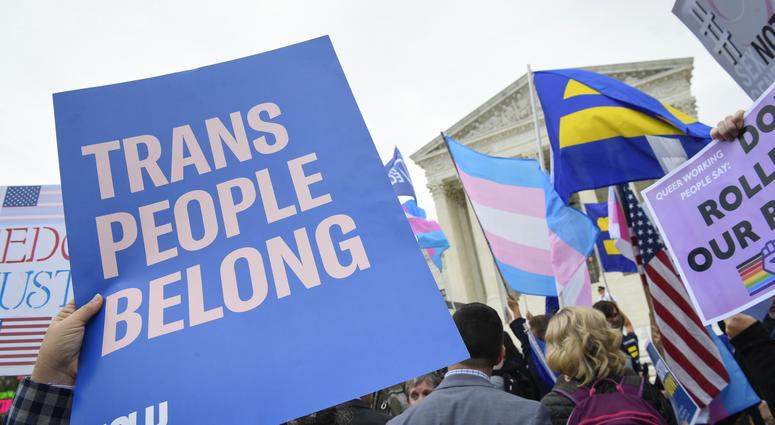This week, the Supreme Court is hearing the cases of people who were fired because they are gay or trans. Many use biblical interpretation to undergird prejudices against LGBTQIA people. As a theologian, psychologist, and preacher, I can say confidently that the biblical witness is this: Each human being is created in the image of God —the Imago Dei.
Each deserves justice and dignity, love and care. No matter our gender, sexuality, racial ethnicity, ability, religion, or station in life, Title VII of the Civil Rights Act protects us.
FURTHER: No one should be fired from their jobs because of their sexual orientation or gender identity. SCOTUS must rule to protect these rights.
It might not be clear to all, but there are two creation stories in Genesis. The first story in Genesis 1 is most familiar. Even atheists know the six-day story of creation and the Sabbath rest God took on the seventh day. God said, “Let there be…” and the world came into existence. On the sixth day, God said, “Let us make humankind in our image, according to our likeness…”
The Hebrew word for humankind is ha’adam. Many Hebrew scholars argue this is a non-gendered word. Just like we might use the word man for “humanity,” this word means all of us. The text goes on to say, “…male and female God created them…” There is no gender hierarchy in this text; all of humanity is created in the image of God.
In the second story in Genesis 2, when the human can’t find a partner in creation, God puts the ha’adam to sleep, and takes what can be translated as “a rib” or “the side” of the human one and creates an “appropriate helper” — ēzer kenegdô. When this “operation” is over, there is an ish, a man and a woman, ishah. We can’t be sure of the gender of that first human, not really. But post-operation, there are two beings — man and woman. For all we know, the first human was a two-sided being, female on one side and male on the other!
In Psalm 139, we are reminded that each human being is awesomely and wonderfully made. God knows us just as we are, and God loves us just as we are. These Hebrew Bible scriptures teach us that humans are created in God’s image, and we are co-creating the world with God. They also teach us that when we look at each other, we see a bit of what God is like.
We learn the full complexity of God when we see a straight white couple and their African-adopted children; when we see a lesbian couple worshipping in church; when we see a transwoman owning her beauty and power at work. When we see this diversity, we see God’s artistic giftedness. If we look with eyes wide open, we see a little bit of God in each of us.
How can we disrespect the image of God in our neighbor? Who are we to decide that one of God’s beautiful creation is not worthy of dignity, respect, and human rights? Black and Brown bodies; male and female bodies; gay and straight bodies; immigrant bodies, poor bodies — God loves all the bodies and sees them as “very good.”
Each of us deserves dignity. Each of us deserves the right to live a full life in this nation, to work and be safe, to earn a living wage, to raise our children and have them grow up to be even better than we are. We have the right to love whom we love and marry them if we so choose (Loving v. Virginia). My LGBTQIA+ siblings deserve a partner that is appropriate for them. These are God-given rights, and it is the job of the Supreme Court of the United States to make sure America keeps her promise to protect them.
The Equal Rights Protection legislation, Title VII, was passed in 1964. That law ought to protect all of us. It ought to protect women, so they can work outside of the home, and make the same pay as men for the same job. It ought to protect Black and Brown people from oppression. It ought to grant religious freedom to Muslims, Jews, and other religious minorities. It ought to provide pathways to differently-abled people to access spaces to work and recreate. And it most certainly ought to protect so-called sexual minorities. It ought to protect gays, lesbians, bisexual, transgender, and intersex people from discrimination. This law already exists.
Our system of government is one of checks and balances, all designed to perfect our union, to help us keep the promise of democracy. If this Supreme Court decides to rule that Title VII does not apply to my LGBTQIA+ family, I will march in the streets of Washington, D.C., and will bring my congregation, my colleagues across the country, and everyone I can find to protest, to disrupt, and to stand against that decision. We who believe in freedom cannot rest until we root out all of the prejudices and biases that lead to a court stacked with people expected to uphold a far-right so-called Christian agenda.
I’m sending this essay to every justice on the Supreme Court. They are not theologians, and so maybe this theological argument will open their hearts. Maybe they need to be reminded of the power they have to make our nation a just one in which all of God’s people enjoy liberty, freedom, and abundant life.
Join me in writing to our justices. Join me in perfecting our union. Raise your voice. Say a prayer. Love your neighbor, no matter who they love or how they look.

